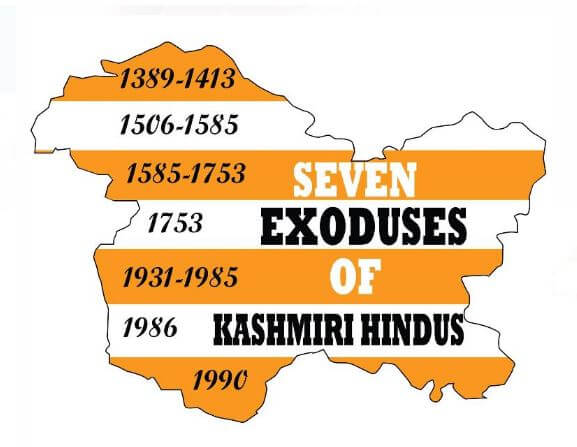2nd February 2022 – It has been over 32 years since the last exodus of Kashmiri Hindus, who are popularly known as Kashmiri Pandits or KPs, took place from the valley of Kashmir on 19th January 1990. The wounds of the exodus and the genocide that followed are still fresh and pain continues to break the hearts. The trauma has been transferred from one generation to the other.
Anuradha Oswal (Mrs. Style Icon, Mrs. South Asia Canada 2017) along with his family moved to Canada in 2004 decided to tell us her story. Her father Shankar Dass Tuli had moved out of the valley in 1980s and settled his family in YOL Camp in Himachal Pradesh. But her father’s brother, Harbans Dass Tuli chose to stay back in the valley. He probably did not know what destiny had in store for him and his family. The religious fundamentalism had started growing in the valley by end of 1980s and the religious minority communities of Hindu and Sikh families in Kashmir were at the target of the terrorist organizations. The establishment of the caliphate was the main objective of these organizations. “My uncle had built a very beautiful house just 6 months before the tragic day. It had a small apple orchard as well. Since, Pahalgam is a very beautiful place; they had invited us to visit them.” But, little did they know that they would have to leave their newly built home like this. She said that they left the home in the same week when the terrorists had asked Kashmiri Pandits to leave the valley. Men were asked to leave their women and daughters back.

Like thousands of other Kashmiri Hindu families, her uncle and his family had to live in a refugee camp near Jammu. The conditions in the camps were bad. With each family restricted to small camps, the women were the worst-affected as the toilets were not easily accessible. The infants had to go without milk or food for several nights.
“When they visited to see their home after a few months, almost all the things in their home were stolen. Did they lose hope? Probably not. But, when the visited the home the third time, they could not believe their eyes. The house was burnt completely. My aunt cried inconsolably. This is the story of not just my family but of hundreds of thousands of KPs” adds Anuradha.
Upon asking about the present day, she says that the abrogation of article 370 and 35A has given some hope to the Kashmiri Pandits. “Can my uncle go back and settle there today? Most likely not. My cousins are now settled in Jammu. They have moved on and set-up a new business, not as big as they used to do in the valley. The point is not that they got re-habilitated today. In fact, the point to ponder is why did they suffer? Whose fault was it?”
The Kashmiri Hindu genocide has not yet been recognized in the minds of common Indian, let alone globally. Calling it the exodus of Kashmiri Pandits, it somehow, never caught the conscience of Hindus who more or less gave more preference to their own castes. The narrative is yet to be built in this direction. An important aspect of justice and reconciliation are the economic and financial reparations, but that destination is surely not in sight. No Kashmiri Hindu organization has asked for it as of now. It is highly disappointing that even the Supreme Court of India had rejected a plea to probe the genocide of Kashmiri Hindus in 2019.
Should they be satisfied with Government of India displaying Vaishno Devi Mandir as the Republic Day Tableau? Should they be satisfied with the abrogation of Articles 370 and 35A? Should they ask for reparations for their sufferings? How do they see this reconciliation happening? These are some of the questions which the Kashmiri Hindus and their representative organizations need to ask themselves first.

